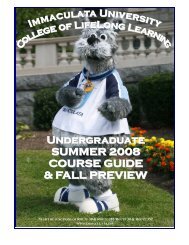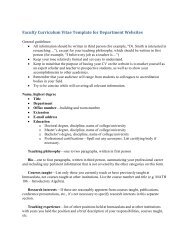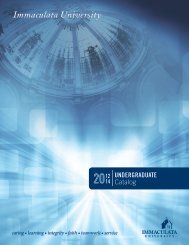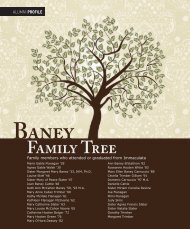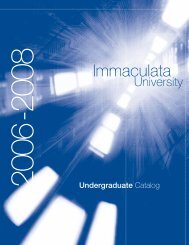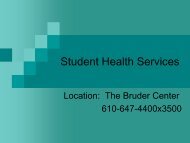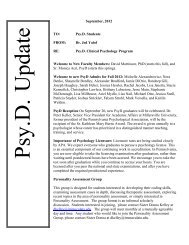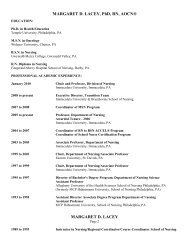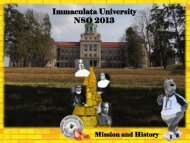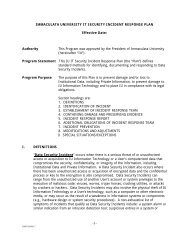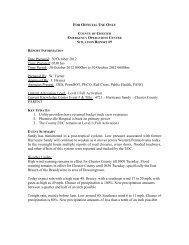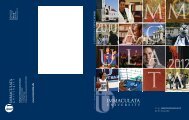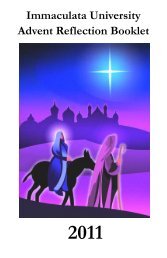Undergraduate Catalog 2008-2010 - Immaculata University
Undergraduate Catalog 2008-2010 - Immaculata University
Undergraduate Catalog 2008-2010 - Immaculata University
Create successful ePaper yourself
Turn your PDF publications into a flip-book with our unique Google optimized e-Paper software.
AREAS OF INSTRUCTION<br />
COURSE NUMBERING SYSTEM<br />
Courses with hyphenated numbers run through the year<br />
(e.g. 103-104). Semester hour credit is indicated in<br />
parentheses after each course title<br />
FIRST YEAR EXPERIENCE PROGRAM<br />
First Year Experience (FYE) program is designed to help the<br />
student successfully navigate the college system by making<br />
progress toward the following educational and personal goals: (1)<br />
developing academic and intellectual competence; (2) establishing<br />
and maintaining interpersonal relationships; (3) developing an<br />
identity; (4) deciding on a career and life-style; (5) maintaining<br />
personal health and wellness; and (6) developing connections with<br />
the university and the community at large.<br />
All students in the College of <strong>Undergraduate</strong> Studies will take First<br />
Year Experience (1 credit) and Personal Fitness and Wellness (2<br />
credits).<br />
FYE 100: Transitions to College (1)<br />
This course is designed to help students make the transition from<br />
high school to college and to make connections within the college<br />
and the community at large. Topics will include: mission and history<br />
of the university, academic resources, study skills, money and time<br />
management, learning styles and issues relating to diversity.<br />
EXS 101: Personal Fitness and Wellness (2)<br />
This course addresses the students’ lifestyles, attitudes, and<br />
behaviors as they relate to personal fitness and wellness. A<br />
combination of lecture and activity sessions empowers the students<br />
to develop personal strategies that will enable them to achieve<br />
positive lifestyle practices.<br />
COLLEGE OF UNDERGRADUATE<br />
STUDIES HONORS PROGRAM<br />
The Honors Program offers talented students an opportunity to<br />
focus their attention on courses that encourage flexibility and<br />
integration of knowledge in an atmosphere of collaborative learning.<br />
The small honors classes foster inquiry and scholarship among<br />
students and faculty. The Honors Program is designed to nurture<br />
student involvement in the education process. Courses emphasize<br />
independent scholarship. All honors courses are identified on<br />
student transcripts.<br />
Program Invitations<br />
Invitations are awarded to high school students who meet the<br />
following criteria:<br />
• SAT composite score (Verbal and Mathematics) of 1100 or better.<br />
• High School GPA of 3.50 or equivalent and/or<br />
• Top 25% of high school class.<br />
Invitations are extended to transfer students and <strong>Immaculata</strong><br />
<strong>University</strong> sophomores who complete a minimum of 24 college<br />
semester hours with a GPA of 3.50. Students who complete fewer<br />
than 24 college semester hours must meet the same criteria as<br />
freshman applicants.<br />
Requirements for Completion<br />
The Honors Program requires 21 credits distributed over three<br />
levels. A student must complete a minimum of 15-18 credits at<br />
Levels I and II, and 3-6 credits at Level III. In addition, the student<br />
is required to maintain a 3.50 GPA. Sophomores and transfer<br />
students must complete 9-12 credits between Levels I and II and 3-6<br />
credits at level III for a total of 15 credits.<br />
Student Generated Honors Option<br />
This is an opportunity for students to propose additional<br />
readings, papers and/or projects which would add an honors<br />
component to an already scheduled course in order to give it honors<br />
status. Students present their proposal to the Honors Committee in<br />
the semester prior to the start of the course and present their final<br />
project at the college Honors Colloquium in the spring.<br />
Curriculum<br />
Requirements: 21 credits from levels I, II and III.<br />
LEVEL I<br />
ENG 113 - 114 HON: English I, II (3,3)<br />
Proficiency in research and critical writing based on a variety of<br />
themes.<br />
HIS 113-114 HON: History I, II (3,3)<br />
Historical theme based on a critical and analytical approach to<br />
learning. Effective writing and scholarly reading demonstrate<br />
independent research.<br />
BIO 191-192 HON: Problems in Environmental Biology<br />
I & II (3,3)<br />
Studies in environment issues and conservation of natural<br />
resources, especially as related to human interactions with our<br />
natural environment. Each course combines basic principles of<br />
ecology with current environmental issues including energy, land<br />
use, pesticides, population growth, and pollution. Basic course<br />
objectives: 1) to provide basic understanding of the scientific<br />
principles underlying conservation and environmental science, 2) to<br />
explore current environmental topics and 3) to begin developing a<br />
personal set of environmental values. Emphasis is placed on a<br />
holistic approach using laboratory exercises, environmental surveys,<br />
and class discussions to reinforce scientific principles. These<br />
courses are appropriate for students with little or no scientific<br />
background. (Fulfills core requirement). (Does not count toward a<br />
science major’s requirement). 2 hours lecture, 2 hours laboratory.<br />
Note: BIOL 191 or permission of instructor is prerequisite for BIOL 192<br />
LEVEL II<br />
ENG 240 HON: World Literature (3)<br />
An introduction to the literature of many cultures. Students write<br />
response papers that explicate and analyze different literary works.<br />
They also research and compose a critical essay that explores the<br />
works of two writers, one from the traditional canon, one from<br />
outside the traditional canon. (Meets cross-cultural requirement)<br />
CCS 335 HON: Global Studies (3)<br />
This is a course in theories of globalization. As the peoples of<br />
the world become more interdependent in terms of technology,<br />
economics, and cross-cultural exchange, various issues arise. We<br />
will examine the major views of globalization and its critics and<br />
examine how the process occurs in the context of one particular<br />
non-Western city. (Meets cross-cultural requirement)<br />
36



